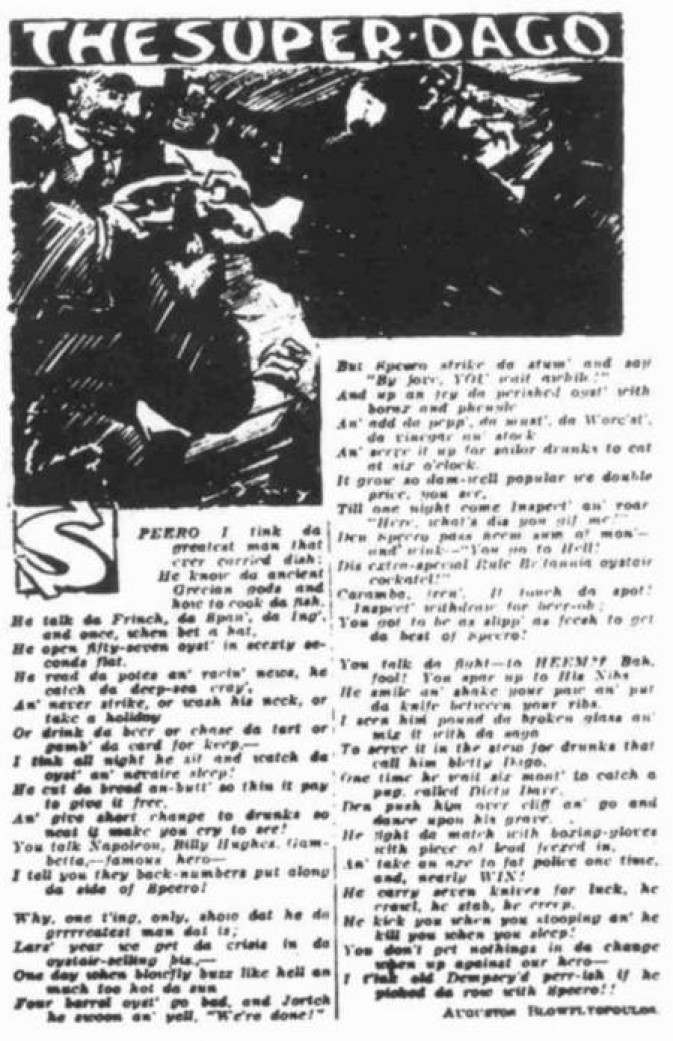Super-Dago
Finey, Smith's Weekly, 30 July 1921.
Verse by 'Augustus Blowflyopoulos'
The Super-Dago
Speero, I tink de
greatest man that ever
carried a dish.
He know the ancient Grecian gods and
How to cook da fish.
He talks the Frinch, da Span', da Ing'
and once when bet a hat,
He open fifty-seven oyst', in seexty seconds flat.
He read da potes an' racing news, he
catch the deep-sea cray',
An' never strike, or wash his neck, or take a holiday.
Or drink da beer or chase da tart or
gamb' da card for keep -
I tink all night he sit and watch da
oyst' an' nevaire sleep!
He cut the bread and butt' so thin it pay
to give it free,
An' give short change to drunks so
neat it make you cry to see!
You talk Napoleon, Billy Hughes
Gambetta, - famous hero -
I tell you back-numbers put along
da side of Speero!
Why on' t'ing only show dat he da
grrrreates' man dat is;
Lars' year we get da crisis in da
oyster-selling biz, -
One day when blowfly buzz like hell an
much too hot da sun
Four barrell oyst' go bad and Jorich
he swoon an' yell, "We're done!"
But Speero strike do stum' and say
"By Jove, You wait a while",
And up an' fry da perished oyst' with
borax and phenyle
An' add da pepp', da must', da Worc'st,
da vinegar an' stock
And serve it up for sailor drunks to eat
at six o'clock.
It grow so dam-well popular, we double
price, you see,
Till one night come Inspect' an' roar,
"Here, what dis you gif me?"
Den Speero pass heem sum o' mon' -
and wink - "You go to Hell!"
Dis extra-special Rule Brittannia oystair
cokatel".
Caramba, fren', It touch da spot!
Inspect' withdraw for beer-oh:
Ya got to be as slipp' as feesh, to get
da best of Speero!
You talk da fight - to HEEM?? Bah
fool! You spar up to His Nibs.
He smile an' shake your paw an' put
da knife between your ribs.
I seen him pound da broken glass an''
mix it with the sago
To serve it in the stew for drunks that
call him bletty dago.
One time he wait six mont' to catch a
pug called Dirty Dave
Den push him over a cliff an' go and
dance upon his grave.
He fight da match with boxing-gloves
With piece a' lead frezed in
An' take an axe to fat police one time
and nearly WIN!
He carry seven knives for luck, he
crawl he stab he creep
He kick you when you stooping an' he
kill you when you sleep!
You don't get nothing in da change
When up against our hero -
I t'ink old Demsy'd perr-ish if he
picked da row with Speero!!.
Augustus Blowflyopoulos.
200 In the Shade.
In March 1988, Bondi identity and former Bulletin journalist, David Swain was commissioned by John Pinder to organise an exhibition for the Melbourne International Comedy Festival. The Exhibition was presented at the State Library of Victoria, and featured 200 years of cartoon depictions of Aborigines.
Later in 1988, William Collins Pty Ltd, published a book of the cartoons called 200 In The Shade.
The cartoons reflected Australia's racist prejudices, attitudes, and fears; underlying attitudes that still persist.
Swain:
"Cartoonists share these prejudices and fears but, by virtue of a special talent, they transmute them through the art form of pictorial humour.
To make fun of people is to exercise power. We all do it, and feel superior to our victims.
Cartoonists specialise in making fun of people. The art of cartooning is popular largely because it articulates this apparently universal need. Cartoonists exercise their power with kindness or with cruelty, and all points in between. The power of the cartoonists in this book to mock the differences of others has been aided by a particular history.
During our years as a self conscious colony lurching towards independence, we pursued a policy of White Australia.
As late as 1961, The Bulletin's slogan was 'Australia for the White Man'. It is hardly surprising that racism flourished, embraced by labourers and the literati.
Cartoonists are people of their times who absorb the common asumptions. They are also influenced by their fellow workers - journalists, editors and owners of the press."
The dago's
The exhibition was supposed to feature cartoons about aborigines, and to reflect both the cartoonists - and by extension - the average Australians, attitude towards aborigines.
4 of the cartoons, (dates 1921, 1930, 1945)of which this is one, however, had as their subject the (black(?)) "dago" - all anti-Greek; and 3 of them - in a real sense - anti-Kytherian.
It was the Kytherians after all who started the oyster saloons. There is considerable history, and a number of photographs pertaining to the oyster saloons on kythera-net.
There are also a number of documents on the site that indicate that Greeks were considered as non-whites. Passenger records and entry visa's for Greeks were not stamped "white" - in the era in question.
These cartoons indicate very clearly the level of antipathy of the general Australian population towards Greeks that prevailed at the time.
The stereoype depicted in these cartoons would last at least 2 generations.
Your grandparents and parents may have suffered because of prejudices of this kind.
